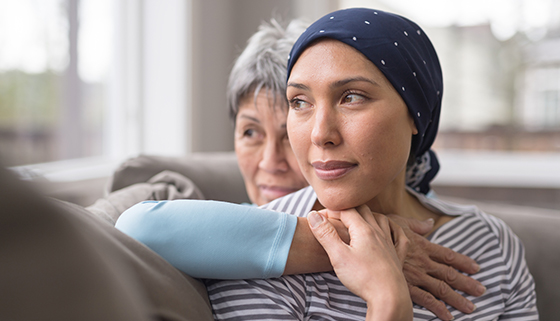Understanding the Benefits of Clinical Trials for Cancer
Reviewed By:
If you have a cancer diagnosis and are weighing your treatment options, consider participating in a clinical trial. Although they may seem intimidating at first, clinical trials can be extremely beneficial — no matter what type or stage of cancer you have.
Benjamin Levy, M.D., clinical director of the Johns Hopkins Kimmel Cancer Center at Sibley Memorial Hospital and a lung cancer researcher, explains some of the reasons to join a clinical trial.
What are the benefits of clinical trials?
Access to the latest therapies
Some of the newest, most innovative cancer treatments are available only through clinical trials. Our understanding of cancer is evolving so quickly, and I think we’re in a different place than we were even five years ago. This research has led to an explosion of new treatment options, many of which are still under investigation.
Closer monitoring
Patients participating in trials are typically followed more closely by their care providers than other patients. The research study itself often mandates a certain number of imaging tests and in-person appointments.
My patients sometimes assume they’ll be treated like a “guinea pig,” but the opposite is true. You’ll have an extra team of doctors and nurses available to you to answer questions and address concerns. This is a hidden benefit of joining a trial. For many, more frequent check-ins is reassuring, as patients better understand how they’re responding to treatment.
Reduced cost
Usually, patients don’t pay for clinical trial drugs. Instead, those costs are covered by the research team. There may be travel expenses or imaging services that the study does not cover, but for most patients, clinical trial therapies are no more expensive than traditional treatments.
Before joining a trial, connect with your insurance provider and medical team to forecast your costs. Many cancer centers have social workers and financial counselors available to assist you.
A chance to help others
Clinical trials are an exciting opportunity to contribute to science and pave the way for future discovery.
I hear from patients all the time that they want to help others with the same disease. Lifesaving therapies that are offered today, such as immunotherapy, are in place because past trials led to their approval.
Who should enroll in a clinical trial?
I recommend clinical trials to all my patients — regardless of their cancer type or stage.
We have too many promising therapies underway to not pursue them at some point during your care. For some patients, a clinical trial is the first line of treatment, and for others, it’s something we bring in later.
Should I be worried about the placebo?
Oftentimes, patients in clinical trials receive one of two treatments: either the experimental therapy or a placebo. It’s important to understand that the placebo needs to be as good as, or better than, the current standard of care. Receiving the placebo does not mean that you won’t receive treatment at all. Your worst case scenario is getting the same standard, effective therapy that patients not enrolled in clinical trials receive.
If you’re concerned about being placed in a placebo group, speak with your research care team. Some trials guarantee that patients will receive the experimental therapy, and they can help you find those.
How do I enroll in a clinical trial?
To get started, talk to your doctor. He or she may know of nearby trials you’d be eligible for. Patients are their own best advocate, and I always encourage them to explore their options. To search for clinical trials near you, visit ClinicalTrials.gov.
Dr. Ben Levy | Clinical Trials at Sibley Memorial Hospital
Lung cancer specialist Benjamin Levy, M.D., shares how the Johns Hopkins Kimmel Cancer Center at Sibley Memorial Hospital is raising the standard in cancer treatment with innovative clinical trials.







